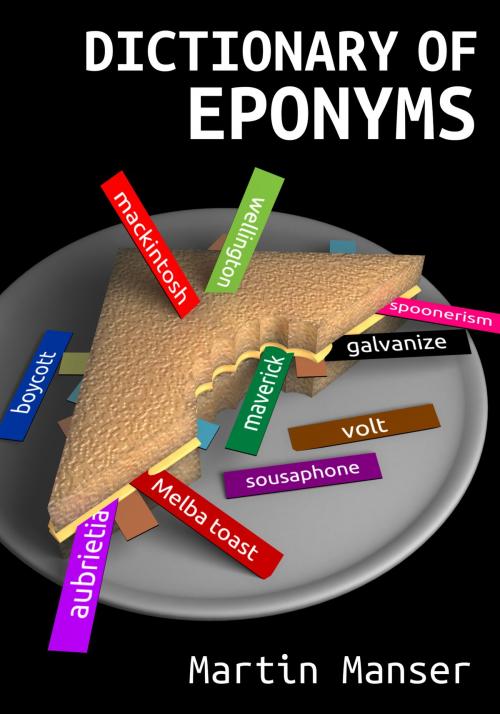| Author: | Martin Manser | ISBN: | 9781624885105 |
| Publisher: | BookBaby | Publication: | January 1, 2013 |
| Imprint: | Language: | English |
| Author: | Martin Manser |
| ISBN: | 9781624885105 |
| Publisher: | BookBaby |
| Publication: | January 1, 2013 |
| Imprint: | |
| Language: | English |
This book explores an aspect of the rich heritage of the English language – the deriving of words from the names of people, eg sandwich, wellington, mackintosh, ampere, watt, volt. Eponyms are the people who give their names to words. Most eponymous words derive from a person’s surname: boycott, from the Irish landlord Captain Charles Cunningham Boycott, dahlia, from the Swedish botanist Anders Dahl, the sousaphone, from the American bandmaster John Philip Sousa, and volt, from the Italian physicist Count Alessandro Volta. Some eponymous words come from literary, biblical, or mythological sources: malapropism, from Mrs Malaprop in Sheridan’s The Rivals, Dickensian – for example, a real old-fashioned Dickensian Christmas – from the English writer Charles Dickens, as old as Methuselah, from the age of the Old Testament patriarch, and aphrodisiac, from the Greek goddess of love and beauty Aphrodite. In this book, I have concentrated on the more well-known eponymous words in general use and have sought to give background detail on interesting aspects of an individual’s life. The entries are listed according to the name of the thing referred to, not the name the thing derives from. So there is an entry spoonerism, which shows the derivation Rev William Archibald Spooner. Note that when the name of the thing itself is a person’s name this is listed in alphabetical order: e.g. an Aunt Sally is listed at Aunt, Mrs Grundy at Grundy, and a smart alec at smart.
This book explores an aspect of the rich heritage of the English language – the deriving of words from the names of people, eg sandwich, wellington, mackintosh, ampere, watt, volt. Eponyms are the people who give their names to words. Most eponymous words derive from a person’s surname: boycott, from the Irish landlord Captain Charles Cunningham Boycott, dahlia, from the Swedish botanist Anders Dahl, the sousaphone, from the American bandmaster John Philip Sousa, and volt, from the Italian physicist Count Alessandro Volta. Some eponymous words come from literary, biblical, or mythological sources: malapropism, from Mrs Malaprop in Sheridan’s The Rivals, Dickensian – for example, a real old-fashioned Dickensian Christmas – from the English writer Charles Dickens, as old as Methuselah, from the age of the Old Testament patriarch, and aphrodisiac, from the Greek goddess of love and beauty Aphrodite. In this book, I have concentrated on the more well-known eponymous words in general use and have sought to give background detail on interesting aspects of an individual’s life. The entries are listed according to the name of the thing referred to, not the name the thing derives from. So there is an entry spoonerism, which shows the derivation Rev William Archibald Spooner. Note that when the name of the thing itself is a person’s name this is listed in alphabetical order: e.g. an Aunt Sally is listed at Aunt, Mrs Grundy at Grundy, and a smart alec at smart.















